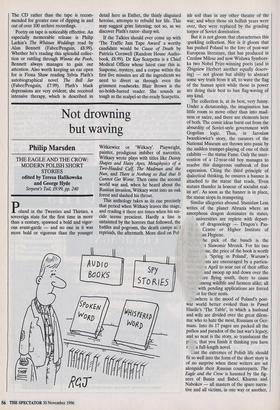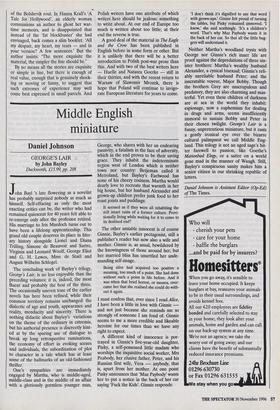Not drowning but waving
Philip Marsden
THE EAGLE AND THE CROW: MODERN POLISH SHORT STORIES edited by Teresa Halikowska and George Hyde Serpent's Tail, £9.99, pp. 240 Poland in the Twenties and Thirties, a sovereign state for the first time in more than a century, spawned a bold and vigor- ous avant-garde — and no one in it was more bold or vigorous than the younger Witkiewicz or Witkacy'. Playwright, painter, prodigious imbiber of narcotics, Witkacy wrote plays with titles like Dainty Shapes and Hairy Apes, Metaphysics of a Two-Headed Calf The Madman and the Nun, and There is Nothing so Bad that It Cannot Get Worse. Then came the second world war and, when he heard about the Russian invasion, Witkacy went into an oak forest and slashed his throat.
This anthology takes as its cue precisely that period when Witkacy leaves the stage, and reading it there are times when his sui- cide seems prescient. Hardly a line is untainted by the horrors that followed, the battles and pogroms, the death camps al 1 reprisals, the aftermath. More died on Pol ish soil than in any other theatre of the war; and when those six hellish years were over, they were replaced by the grinding torpor of Soviet domination.
But it is not gloom that characterises this .;parkling collection. Nor is it gloom that has pushed Poland to the fore of post-war European literature, that has produced in Czeslaw Milosz and now Wislawa Symbors- ka two Nobel Prize-winning poets (and in Zbigniew Herbert another equally deserv- ing) — not gloom but ability to abstract some wry truth from it all, to wave the flag of the human spirit while those in power arc doing their best to ban flag-waving of any kind.
The collection is, at its best, very funny. Under a dictatorship, the imagination has little room to move other than into mad- ness or satire, and there are elements here of both. The comic ideas burst out from the absurdity of Soviet-style government with Gogolian logic. Thus, in Jaroslaw Iwaszkiewicz's story, the curators of the National Museum are thrown into panic by the sudden trumpet-playing of one of their exhibits — the statue Fame. Only the inter- vention of a 12-year-old boy manages to resolve this dangerous outbreak of free expression. Citing the third principle of dialectical thinking, he ensures a banner is attached to the statue that reads, `Even statues thunder in honour of socialist real- ist art'. As soon as the banner is in place, the statue stops its trumpeting.
Similar allegories abound. Stanislaw Lem writes of the planet Abrazia where an amorphous dragon dominates its states, universities are replete with depart- of dragonology — Dragon's Pas- Centre or Higher Institute of *an Hygiene.
he pick of the bunch is the t Slawomir Mrozek. For his two ne, the price of the book is worth 'Spring in Poland', Warsaw's nts are encouraged by a particu- i April to soar out of their office and swoop up and down over the ore flying south, there to cause among wildlife and farmers alike; all with pending applications are forced at for their nests.
.owhere is the mood of Poland's post- war world better evoked than in Pawel Huelle's 'The Table', in which a husband and wife are divided over the great dilem- ma: who to hate the most, Russians or Ger- mans. Into its 17 pages are packed all the pathos and paradox of the last war's legacy, and so neat is the story, so translucent the p- e, that you finish it thinking you have r a full-length novel.
aat the extremes of Polish life should fit so well into the form of the short story is of no surprise when these writers are set alongside their Russian counterparts. The Eagle and the Crow is haunted by the fig- ures of Bunin and Babel, Kharms and Nabokov — all masters of the spare narra- tive and all victims, in one way or another, of the Bolshevik rout. In Hanna Krall's 'A Tale for Hollywood', an elderly woman commissions an author to ghost her war- time memoirs, and is disappointed that instead of the 'fat blockbuster' she had envisaged, back comes a slim booklet. 'All my despair, my heart, my tears — and in your version? A few sentences.' But the author insists- 'The more exquisite the material, the simpler the line should be.'
By no means all the stories are exquisite or simple in line, but there is enough of real value, enough that is genuinely shock- ing or moving or funny, to suggest that such extremes of experience may well come best expressed in small parcels. And Polish writers have one attribute of which writers here should be jealous: something to write about. At our end of Europe too much is written about too little; at their end the reverse is true.
A good deal of the material in The Eagle and the Crow has been published in English before in some form or other. But it is unlikely that there will be a better introduction to Polish post-war prose than this. And with two of the best writers here — HueIle and Natasza Goerke — still in their thirties, and with the recent return to Warsaw of Slawomir Mrozek, there is hope that Poland will continue to invigo- rate European literature for years to come.



















































































 Previous page
Previous page